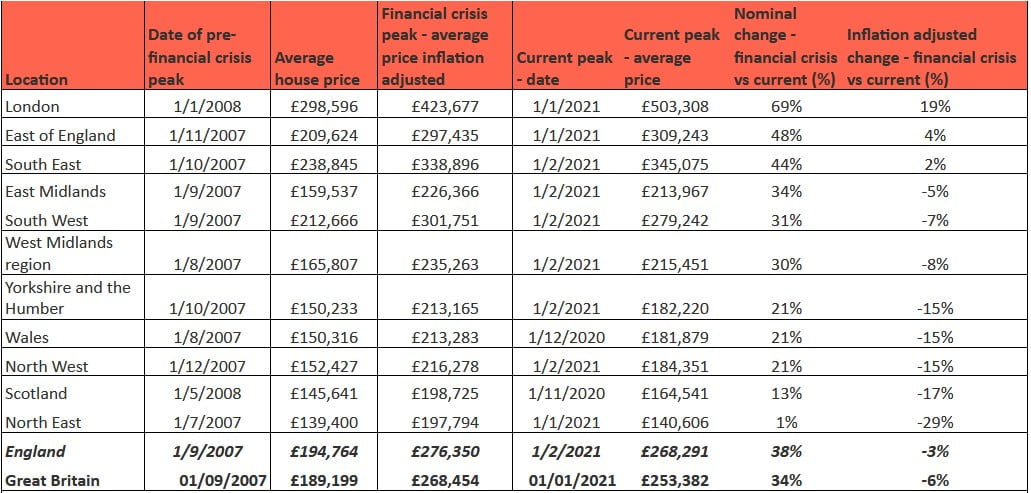The latest research from Warwick Estates has revealed that while house prices are currently at an ‘all time high’, they’re yet to surpass their pre-financial crash peaks in all but three Britain regions, when taking inflation into account.
Q1 2021 hedge fund letters, conferences and more
Britain's House Prices Skyrocket
The average house price across Britain currently sits at a dizzying £253,382 according to the latest figures from the Land Registry. That’s 34% higher than the market peak of £189,199 in September 2007, before the worst property market crash of recent times brought the market to its knees.
However, while the market is currently running red hot as a result of the stamp duty holiday, the research from Warwick Estates shows that it hasn’t quite reached the same level as 2007.
Warwick’s research shows that when adjusting for inflation the average house price of £194,764 prior to the financial crash would be the equivalent of £276,250 in today’s market. This means that the current average property price of £268,291 still sits some -3% below historic highs.
The North East is the region currently further off the pace when compared to its pre-financial crash peak of £139,400. While property prices currently sit 1% higher today at £140,606, they are actually -29% lower when taking inflation into account.
Scotland (-17%), the North West (-15%), Wales (-15%) and Yorkshire and the Humber (-15%) are also home to some of the lowest property values when accounting for inflation and comparing them to their 2007 peaks.
Just three regions are currently home to a higher average house price when compared to their 2007 peaks and when adjusting for inflation.
Prior to the financial crash, the average London house price hit £298,596 before the market crashed. Today, this has increased by 69% to £503,308. Even when adjusting for inflation, the current average London house prices sits 4% higher than the pre-financial crash peak seen at the start of 2008.
The East of England and the South East have also seen a stamp duty boost push house prices higher than their 2007 peaks. Even after adjusting for inflation, the average house price is now 4% higher in the East of England and 2% higher in the South East.
Property Prices Boosted By Stamp Duty Holiday
COO of Warwick Estates, Emma Power, commented:
“The market is currently performing very well with house prices climbing to historic highs across all areas of Britain thanks to the additional boost of the stamp duty holiday.
We’re also seeing market values sit some 34% higher than their pre-financial crash peaks and so the overall market remains in very good health indeed.
However, when taking inflation into account, we’re yet to see a full return to form across all regions of Britain and, in fact, homes across just three regions are worth more than their 2007 price peaks when adjusting for inflation.
That said, with the market moving at a current rate of knots and likely to do so for the remainder of the year, it might not be long before the entire market surpasses the pre-financial crash peaks of 2007.”
Data on house prices sourced from Gov.uk - UK House Price Index, based on the house price peak of each region prior to the financial crash and the change between then and the latest house price peak in 2020/2021
- Warwick Estates was founded in 2007, and acquired by Aldridge in 2017 with the ambition to grow and strengthen the business.
- The goal of growth is one that unites the Aldridge family today across the diverse range of commercial and philanthropic activities in which it operates.
- Over 40,000 properties are managed for freeholders, asset funds, housebuilders and housing associations - a combined value of over £9bn.
- Annual revenues exceed £10million
- Warwick Estates is run by a newly strengthened management team of industry heavy-weights with decades of combined industry experience - chaired by Adrian Ringrose, former CEO of Interserve
- Current head-count is 186 staff at seven office locations throughout England







